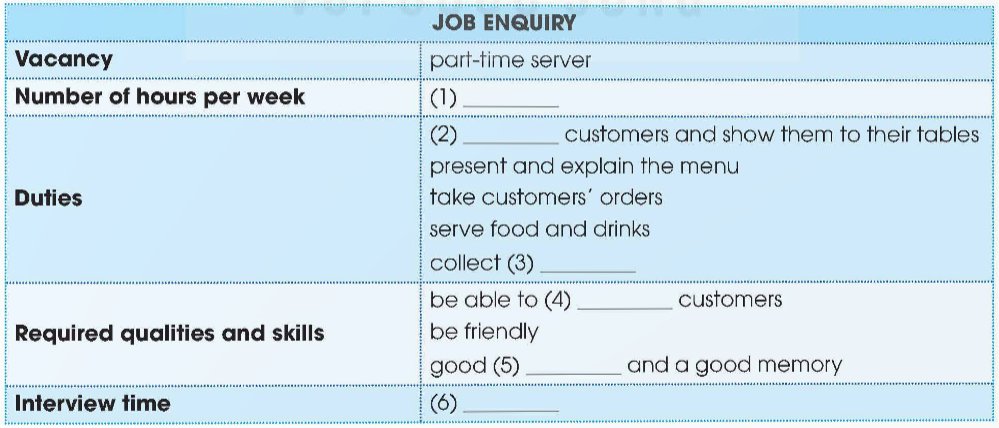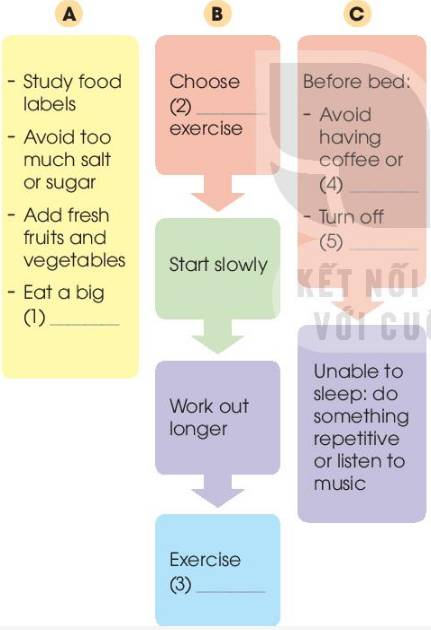Listen to the conversation again and complete the notes. Use no more than TWO words for each gap.

Listen to the conversation again and complete the notes below. Use no more than TWO words for each gap.
ABC Vocational School
| |
Courses | Tour guide training, hotel and restaurant management, cooking, etc. |
Types of cooking courses
| Short courses: - for all ages and abilities - duration: two or three (1) ________ (2) __________ courses: - for people training to be (3) ________ - duration: two years |
Hands-on experience
| Work as a(n) (4) _________ in a real restaurant |
Information about the school | Parents and students can study the (5) __________ |
1. months
2. Professional
3. restaurant cooks
4. apprentice
5. (school) brochure
Read the conversation again and complete the notes. Use no more than TWO words for each blank.
Future cities | |
Green city | Smart city |
- More than 50% of it is made up of (1) ___________. - Using public transport will help reduce (2) ___________ and pollution. | - AI (3) ___________ will help the city operate more efficiently. - High-rise buildings will help solve the (4) ___________ problems |
1.green areas
2.traffic jams
3.technologies
4.housing
Listen to the talk again and complete each gap in the notes with no more than THREE words and/or a number.
TRANG AN SCENIC LANDSCAPE COMPLEX
Quick facts
- Recognised as the first mixed World Heritage Site in (1) ______________
- Famous for its beautiful landscape and long cultural history
- Consists of (2) ______________
Natural beauty and biodiversity
- Beautiful limestone mountains, valleys, and rivers
- More than (3) _____________ of plants and 200 types of animals
Cultural heritage
- Caves showing how (4) _____________ lived over a period of 30,000 years
- Hundreds of temples and historic pagodas
Current condition
- The landscape is not changed or damaged by human activities.
- Most of the site is still kept in its (5) _____________, e.g. the original style of architecture.
1. 2014
2. three protected areas
3. 600 types
4. early human
5. natural states
Listen again and complete the notes with no more than TWO words for each answer.
Advice fer students while studying abroad
Learning the foreign language
• helps you understand the lectures at the university and (1) ___________ the exams
• enables you to take part in (2) __________ local people, thus making you more confident in your daily life
Getting a part-time job
• earns some (3) __________ to cover expenses and start saving
• helps you gain some (4) ___________
Learning how to cook for yourself
• saves you lots of money
• gives you a sense of freedom and (5) ___________
1. study for
2. conversations with
3. pocket money
4. work experience
5. independence
Read the article again. Complete the diagrams with information from the text. Use no more than TWO words for each gap.

1 - breakfast
2 - suitable
3 - regularly
4 - energy drinks/exercising
5 - electronic devices
1. breakfast
2. suitable
3. regularly
4. energy drinks
5. electronic devices
Read the text again. Complete the diagrams with information from the text. Use no more than TWO words for each gap.

(1): solutions
(2): best option
(3): to-do lists
(4): night's sleep
Read the text and complete the notes. Use no more than TWO words for each gap.
For people in most cultures, the generation gap in their family is mainly about differences in musical tastes, career choices, and lifestyles. In Asian American families, however, the process of adapting to American culture makes the generation gap wider.
Naturally, children of Asian American immigrants adapt to American culture much faster than their parents. English quickly becomes their first language. They accept American values such as individualism, freedom, honesty, and competition. They also start to follow American traditions in their daily lives.
On the other hand, many first-generation Asian American parents fail to adapt to the new culture. They continue to use their native language. They keep practising their traditional lifestyle and old culture. They often try to force their children to follow their native country's cultural values, such as the importance of family, respect for the elders and the community.
Due to their different attitudes to the new culture, Asian American children may have cultural values different from their parents' Asian cultural values. They may not do what their parents want them to do or what they are expected to do. As a result, Asian American parents may fail to have their children follow the family traditional values.
ASIAN AMERICAN CHILDREN | FIRST-GENERATION ASIAN AMERICAN PARENTS |
Adapt to American culture faster Speak (1) __________________ as their first language Accept American values: individualism, freedom, honesty, and competition Start to follow (2) __________________ in their daily lives | Fail to adapt to American culture Use their (3) __________________ language Practise a traditional lifestyle and their old culture Try to force children to follow native country's (4) __________________: Importance of family respect for the elders and community |
1. English
2. American traditions
3. native
4. cultural values
Listen to the interview again and complete the table. Use no more than THREE words for each answer.
Situations | Problems |
There are cameras and sensors everywhere. | City dwellers may lose their (1) _________ in public areas. |
People use (2) _________ to help them with household chores. | It is not easy for some people to get familiar with and use the smart devices. |
Some city dwellers (3) _________ with each other face to face less. | There is no (4) __________ in the neighbourhood. |
1. right to privacy
2. smart technologies
3. interact
4. sense of community
Read the article again and complete the diagram with information from the text. Use no more than TWO words for each answer.

1. support
2. operate
3. green space
4. transport systems
Listen to the conversation again and answer the following questions using no more than TWO words.
1. What does Mai's mother keep complaining about?
2. Where doesn't Mai's mother allow her to wear tight jeans?
3. What does Kevin mainly use his smartphone and laptop for?
4. According to Mai, what might Kevin's parents worry about?
5. What time do Kevin's parents take away his smartphone and laptop?
1. Her appearance
2. At school
3. His homework
4. His eyesight
5. 10 p.m